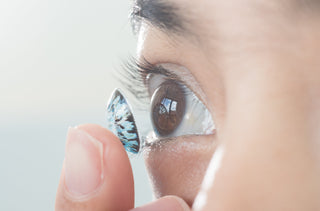Can I wear contact lenses to correct presbyopia?
Whether you already wear contact lenses or not, multifocal contact lenses can be an excellent option for the onset of presbyopia.
Throughout life, the crystalline lens, the eye's natural lens, progressively loses its natural elasticity, which allows it to move from distance to near vision. This function is called accommodation. The loss of accommodation (presbyopia) is physiological and affects everyone after the age of 40.
Multifocal contact lenses
Multifocal contact lenses allow you to see at both 30 cm and 3 metres. These contact lenses consist of several concentric zones of correction. The center of the lens often allows for near vision, and the more you move towards the periphery, the more you correct for distance vision. The mechanism is based on the degree of dilation of the pupil. When you look at a book, the pupil constricts in the central zone of the lens, the zone dedicated to near vision. On the other hand, the further away we try to look, the more dilated it becomes. The eye collects all the images, and the brain sorts them out to keep only the sharp ones.
Are multifocal contact lenses suitable for you?
Here are some things to consider before you start wearing multifocal contact lenses
Benefits:
- No need to wear glasses to read.
- High visual acuity for near and distance vision.
- Same capabilities as glasses with progressive lenses but with a shorter adaptation time.
Disadvantages:
- Moving from one correction area to another takes some learning time.
- Depth perception may be inaccurate.
- Visual fatigue may be experienced by multifocal contact lens wearers who work a lot in front of a computer screen.
Many multifocal lenses are available today, and you can find them in monthly, daily, and even continuous wear versions. Many suppliers now offer brands of multifocal contact lenses. Ask your IRIS professional about the best option for your condition and lifestyle.





















































